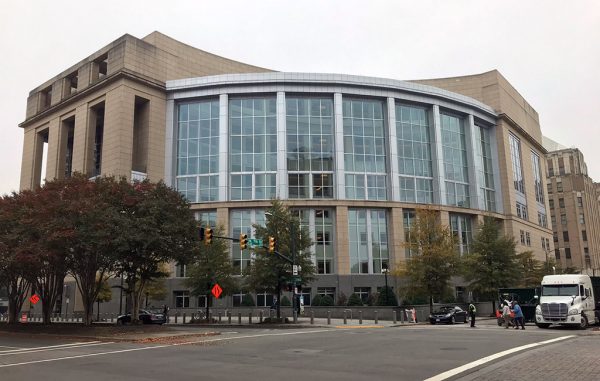Editor’s note: This story has been updated to include a statement from the Federal Reserve.
A former Federal Reserve Bank of Richmond employee is facing criminal and civil charges for allegedly pocketing hundreds of thousands of dollars by using illegal inside information to trade on the stocks of the same financial institutions he was tasked with examining.
Robert Brian Thompson, 43, was charged earlier this month by the U.S. Attorney’s Office with insider trading and related civil allegations from the Securities and Exchange Commission.
Thompson, a Chesterfield County resident who worked at the Fed from 2004 until earlier this year, had most recently been a bank examiner whose purview was to help regulate 18 large banks with assets of more than $100 billion.
Among that group was Capital One and New York Community Bancorp, and from at least October 2020 through February of this year, the allegations claim that Thompson traded stock in the two banks using “material nonpublic information” that he obtained due to his position at the Fed.
“Thompson placed each of his unlawful trades on the basis of material nonpublic information he received from his job about the relevant bank’s upcoming earnings announcement or other disclosure that Thompson knew or believed would cause the stock price to move in a direction favorable to his stock or options positions.”
The criminal charges identify the institutions only as “Bank 1” and “Bank 2,” while the SEC allegations against Thompson specifically name Capital One and NYCB.
And there may have been other banks involved in his alleged scheme. Court records claim Thompson made 69 trades, both purchases and sales, of tens of thousands of shares in more than seven different publicly traded financial institutions for a total of $771,000 in personal profits.
Pertaining to his alleged Capital One trades, court filings claim that Thompson received an email last year from a colleague showing that the bank’s yet-to-be-released earnings would significantly exceed market analyst estimates.
Two weeks later, just hours before Capital One was set to release those earnings publicly, Thompson allegedly purchased 7,500 shares of Capital One stock at a cost of $678,000 or $90.40 per share.
The stock popped 9% the next day after the earnings release, and the government claims Thompson sold his shares at $100.98 apiece, resulting in $79,000 in “ill-gotten” profits.
Then, earlier this year, Thompson allegedly learned from worked related communications that NYCB would be announcing significant losses related to loans it took on as part of its acquisition of a then-failing Signature Bank.
On Jan. 29, the government claims Thompson purchased 1,600 options on NYCB shares at a cost of $14,000, which would allow him to profit if the bank’s stock price fell.
The case claims Thompson didn’t cover his tracks all that well, as the options he purchased allegedly accounted for 99% of the options trading value on NYCB stock that day.
Upon announcing its earnings two days later, NYCB’s stock dropped 37%. The next day Thompson allegedly sold his options, reaping a profit of approximately $505,000. That equaled a return on his investment of 3,745% in less than a week, the government claims.
Federal regulations prohibit employees of the Federal Reserve System in Thompson’s position from trading in bank securities altogether. Employees are required to regularly file forms to declare their financial holdings.
In addition to the insider trading allegations, Thompson is charged with making false statements related to allegedly lying on documentation he was required to file with the Fed claiming he owned no such assets. However, the government claims he had a portfolio with more than $500,000 worth of bank stocks and options.
Thompson was charged in the two cases on Nov. 8. The U.S. Attorney filed its case via the criminal information process, which doesn’t involve the defendant’s arrest.
The government seeks to force Thompson to forfeit any gains derived from the alleged scheme. The SEC charges also call of unspecified civil penalties.
Thompson is due to make his initial court appearance for a bond and plea hearing on Tuesday at 2:30 before Magistrate Judge Mark Colombell in the federal court building in Richmond.
Thompson is represented by Megan Rahman and John West of the law firm Troutman Pepper. A request for comment sent to the attorneys was not returned by press time.
The Richmond Fed, in a statement sent to BizSense, said it cooperated with the authorities during the Thompson investigation.
“The former employee’s alleged actions are a direct violation of our well-established and well-communicated policies on ethics and conflicts of interest. Because this matter is before the court, it would be inappropriate to comment further,” the statement read.
A spokesperson for the Federal Reserve Board also released a statement, saying “There is no place at the Federal Reserve for the misuse of confidential information. We have robust safeguards in place to ensure that those who have access to supervisory information understand their responsibilities and obligations, including the outright prohibition on trading in bank stocks. We require regular training, as well as affirmations by our staff that each person understands and is committed to the highest standards of professional behavior.”
Editor’s note: This story has been updated to include a statement from the Federal Reserve.
A former Federal Reserve Bank of Richmond employee is facing criminal and civil charges for allegedly pocketing hundreds of thousands of dollars by using illegal inside information to trade on the stocks of the same financial institutions he was tasked with examining.
Robert Brian Thompson, 43, was charged earlier this month by the U.S. Attorney’s Office with insider trading and related civil allegations from the Securities and Exchange Commission.
Thompson, a Chesterfield County resident who worked at the Fed from 2004 until earlier this year, had most recently been a bank examiner whose purview was to help regulate 18 large banks with assets of more than $100 billion.
Among that group was Capital One and New York Community Bancorp, and from at least October 2020 through February of this year, the allegations claim that Thompson traded stock in the two banks using “material nonpublic information” that he obtained due to his position at the Fed.
“Thompson placed each of his unlawful trades on the basis of material nonpublic information he received from his job about the relevant bank’s upcoming earnings announcement or other disclosure that Thompson knew or believed would cause the stock price to move in a direction favorable to his stock or options positions.”
The criminal charges identify the institutions only as “Bank 1” and “Bank 2,” while the SEC allegations against Thompson specifically name Capital One and NYCB.
And there may have been other banks involved in his alleged scheme. Court records claim Thompson made 69 trades, both purchases and sales, of tens of thousands of shares in more than seven different publicly traded financial institutions for a total of $771,000 in personal profits.
Pertaining to his alleged Capital One trades, court filings claim that Thompson received an email last year from a colleague showing that the bank’s yet-to-be-released earnings would significantly exceed market analyst estimates.
Two weeks later, just hours before Capital One was set to release those earnings publicly, Thompson allegedly purchased 7,500 shares of Capital One stock at a cost of $678,000 or $90.40 per share.
The stock popped 9% the next day after the earnings release, and the government claims Thompson sold his shares at $100.98 apiece, resulting in $79,000 in “ill-gotten” profits.
Then, earlier this year, Thompson allegedly learned from worked related communications that NYCB would be announcing significant losses related to loans it took on as part of its acquisition of a then-failing Signature Bank.
On Jan. 29, the government claims Thompson purchased 1,600 options on NYCB shares at a cost of $14,000, which would allow him to profit if the bank’s stock price fell.
The case claims Thompson didn’t cover his tracks all that well, as the options he purchased allegedly accounted for 99% of the options trading value on NYCB stock that day.
Upon announcing its earnings two days later, NYCB’s stock dropped 37%. The next day Thompson allegedly sold his options, reaping a profit of approximately $505,000. That equaled a return on his investment of 3,745% in less than a week, the government claims.
Federal regulations prohibit employees of the Federal Reserve System in Thompson’s position from trading in bank securities altogether. Employees are required to regularly file forms to declare their financial holdings.
In addition to the insider trading allegations, Thompson is charged with making false statements related to allegedly lying on documentation he was required to file with the Fed claiming he owned no such assets. However, the government claims he had a portfolio with more than $500,000 worth of bank stocks and options.
Thompson was charged in the two cases on Nov. 8. The U.S. Attorney filed its case via the criminal information process, which doesn’t involve the defendant’s arrest.
The government seeks to force Thompson to forfeit any gains derived from the alleged scheme. The SEC charges also call of unspecified civil penalties.
Thompson is due to make his initial court appearance for a bond and plea hearing on Tuesday at 2:30 before Magistrate Judge Mark Colombell in the federal court building in Richmond.
Thompson is represented by Megan Rahman and John West of the law firm Troutman Pepper. A request for comment sent to the attorneys was not returned by press time.
The Richmond Fed, in a statement sent to BizSense, said it cooperated with the authorities during the Thompson investigation.
“The former employee’s alleged actions are a direct violation of our well-established and well-communicated policies on ethics and conflicts of interest. Because this matter is before the court, it would be inappropriate to comment further,” the statement read.
A spokesperson for the Federal Reserve Board also released a statement, saying “There is no place at the Federal Reserve for the misuse of confidential information. We have robust safeguards in place to ensure that those who have access to supervisory information understand their responsibilities and obligations, including the outright prohibition on trading in bank stocks. We require regular training, as well as affirmations by our staff that each person understands and is committed to the highest standards of professional behavior.”






I mean, with the position that the dude had, he’s “gotta pump those numbers up. Those are rookie numbers in this racket.” All jokes aside, I think that one options trade that accounted for 99% of the options trading on a given security on a given day was pretty bad.